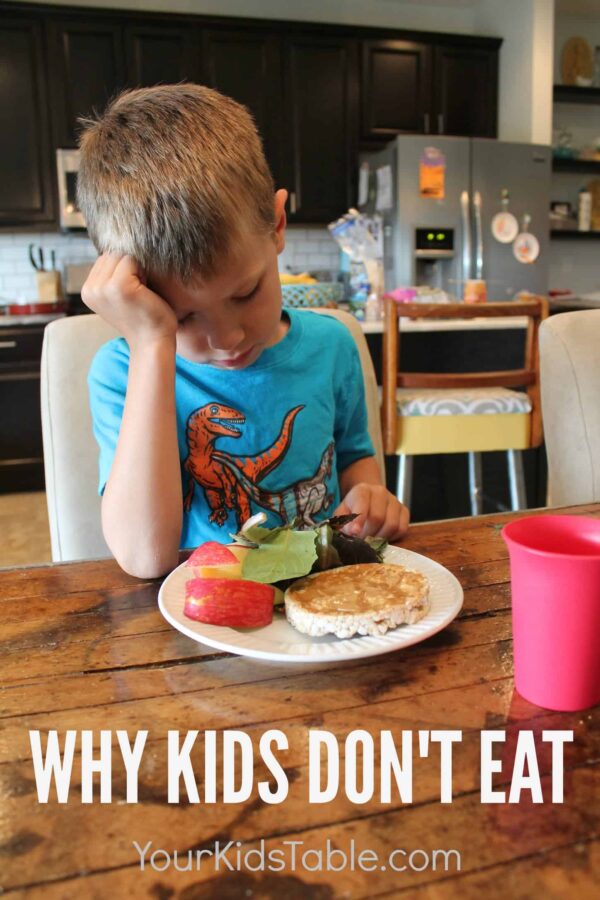My 5 Year Old Wont Eat Lunch at School
Feel like you're banging your head against the wall trying to figure out why your kid won't eat anything or refuses to eat at all? There are real reasons and ways you can help them. Learn how from a feeding expert and mom.

People ask me all the time "Why doesn't my kid eat?" Most of you know how frustrating meal time can be when you try something new, or worse, when you serve something they've eaten before and then refuse to eat! Most kids will do this occasionally, but for some, it is a way of life. So, what gives?
There is value in doing some detective work because getting to the root of the problem will then give you the tools to help them eat more food, more consistently. In my experience, as a licensed occupational therapist and with my specialized feeding education, I believe there are 5 different reasons kids refuse to eat.
Well, a variety of factors can contribute and the reasons can evolve over time.Well, actually there are A LOT of reasons, but most of them tend to fall into one of these categories.
At the same time, it is common for several of these underlying issues to affect a child's ability to eat well at the same time.
Keeping that in mind, let me a explain in some more detail.
5 Reasons Why Children Won't Eat
1. Medical
Although this may seem like the most obvious reason kids don't eat, it is often the most overlooked. Well, at least it isn't always explored deeply enough. When kids have a well documented medical condition or are visibly sick, it is obvious that their eating can be affected, but sometimes there are more subtle issues. Two of the biggest culprits are acid reflux and constipation. Both of these very common problems for kids can put a halt to eating.
Although acid reflux is common in babies, it can also have an impact on kids much older, even if they weren't diagnosed as an infant. Unfortunately, many times this is overlooked because kids don't complain that their stomach is hurting. Many of them don't even realize it because they have felt that way for so long OR they are too young to put into words how they are feeling. Click to read more about acid reflux in children and to find a few natural remedies.
My older son has struggled with constipation since he was about one year old. I have to carefully watch his fiber intake and when he starts to get a little backed up, his eating is greatly affected. Every time he has a bad meal, I have to ask myself, "Does he need to go to the bathroom?" The answer is usually, "Yes!" Managing your child's constipation can be a huge game changer in helping them eat new foods. Read more about severe constipation in children and natural remedies to fix it.
If your child's refusal to eat is more of a phase, you may want to consider teething, not feeling well, or fatigue as possible reasons for not eating. And sometimes, if your child is chronically sick or tired, then picky eating can then be more long term.
If you read through the rest of this post and feel that none of the other categories fit with why your child isn't eating, I would strongly encourage you to think about any possible stomach issues. There are many other, although less common, possibilities than I'm listing here. Definitely discuss it further with your doc, there are some really simple fixes for some of these problems.

2. Sensory
For many "picky eaters", sensory processing plays a big role in their refusal to eat foods. Simply put, if something feels gross in their mouth or on their hands, they aren't going to eat it. The fancy therapeutic term we give for when a child doesn't want to touch different textures is tactile defensive. And, when they don't like certain textures in their mouth, or chew/bite/lick everything else but food, it is a sign that their oral sensory system needs some help.
Clues that your child may be refusing foods because of sensory input are: gagging, squirming, or seeming frightened by the sight, smell, touch, or taste of a particular food. Oral aversion also fits into this category. If your child has had medical testing, feeding tubes, severe vomiting, or a physical incident in or around their mouth/throat (even from a infancy), they may be scared to have anything come toward their mouth and be overly sensitive in the area.
On the other end of the sensory spectrum, a child may not be able to discriminate food in their mouth well and they will unsafely stuff a large amount of food into their cheeks like a chipmunk. This helps give them some feedback as to where the food actually is. These kids lose track of the food easily and can't chew it well. Soft foods that aren't easily discriminated (think mashed potatoes, cheese, etc.) are usually refused because they can't manipulate them well in their mouth.
Sensory is often the hidden link in picky eating, and while a lot of parents haven't heard of it before, I promise it is worth your time reading a little more on it. If you can understand why your child is refusing food from a sensory perspective, well, it changes everything. To understand the connection better, read sensory processing and picky eating. If you want to dive into a whole plan for sensory kids, then read the picky eating plan I used for my son.
3. Mechanics/Oral-Motor Skills
This one might be a little tricky for parents to figure out because you need to consider how well your child is chewing and swallowing their food. Therapists call this oral-motor skills. You can probably rule this out if you have a child over 2.5 that safely and easily transitioned onto table foods as babies. Signs that your child may not be chewing well are: choking/gagging after the food is already in their mouth for a few seconds/minutes, spitting out half chewed food, or throwing up food that looks like it has hardly been chewed. They also may have had difficulty breastfeeding.
Kids will start refusing to eat foods because they don't know how to chew it or they are scared they are going to gag/choke/throw up again on the food they literally don't know how to eat. They will often stick to a limited diet because they know they can eat those food safely. Head over to Oral Motor Exercises to learn more about how to help your child improve their oral motor skills.
Sometimes oral motor difficulties snowball to include sensory defensiveness too, because when a child hasn't eaten any other textures in a really long time or ever, they become very sensitive to them. These other textures may seem strange and even uncomfortable when they touch or feel them.
If your child never transitioned well to crunchy table foods, then you'll want to check out How to Transition Toddler to Finger Foods and 8 Things You Can Do When a Toddler Refuses to Eat, even if your child is older than that. The simple techniques and tips are the same!
4. Routine
What do I mean by routine exactly? Well, I strongly believe that structure and routine around food and meal time is critical to kids eating well. I know there are a few kids out there that will manage to eat well with the lack thereof, but by in large, most kids eating habits will suffer greatly without a regular routine.
* Learn 3 Keys to Turn Around Picky Eating, even for REALLY picky eaters, in my free workshop. We'll send you a free workbook too! *
This can be a touchy subject for parents, we all have our comfortable eating habits and routines that we have already established for ourselves as adults. We often continue to do what is comfortable for us with our kids, but it isn't always what leads us to teaching them habits that we really want them to have. If you don't have regular meal times, pay attention to how frequently they are eating. Do you eat in front of the TV often, and/or mostly let your kids pick what they want to eat? If they aren't eating well or willing to try foods, lack of routine may be the reason for it… or at least part of it.
I commonly see this compounded on top of one of the other 4 reasons kids don't eat. When there is a problem with eating, we get overwhelmed and start grasping at straws just to get them to eat. This is another way the bad habits can begin and then play a role in poor eating. That's not to say that you're to blame, I mean our kids have to eat, right? And, we do the best we can with what we know. Don't feel guilty about choices you've made in desperate situations.
I promise you that even with the pickiest eaters, there is a way out of eating in front of an iPad or them having their own separate meals. It is one step at a time and I'll show you how in my tips below.
One other common factor is that some children start off as good eaters, and then between 1-2 years of age, eating starts to go awry. Annoying, upsetting.. yes! Like it or not though, it is NORMAL for toddlers to go through a picky eating stage as their taste buds mature and they begin to want to exert some control into their lives. Parents, sometimes, get scared when their once "good" eater is now not eating well, and will begin to throw routine and structure out the window. Short order cooking is ushered in, among numerous and otherwise well-meaning, but sabotaging techniques, and parents are left with a bona fide picky eater months or years later.
This can be sooo challenging to wade through, I have been there with all my kids. If you want a peek into how I handle meals with my kids, read Feeding Tips from My Table.
5. Behavior
I put behavior at the end of this list for a reason. I want this to be the last thing that you consider. A lot of people advise parents that kids are being "bad" or that the reason they are refusing to eat well is behavior based. Although behavior plays a role, it is actually a small percentage of kids that actually refuse to eat based solely on behavior.
Now, please don't mistake me, even the youngest of tykes will learn quickly what they need to say or cry or throw to get what food they want. All kids go through different stages of development when they are testing boundaries and you can bet they will test it at meal times, too. After all, this is one of the few areas where they actually have some control. But, these kinds of little phases are short lived and aren't severe. For kids that have a history of being picky or poor eaters, behavior is a piece of the puzzle, but typically it has evolved from one of the legitimate reasons listed above.
What to Do When Your Child Won't Eat

I have dozens of articles I've written about how to overcome picky eating (yes, there is hope) here on Your Kid's Table, but I don't want to leave you hanging here without a plan.
No matter what the combination of reasons above that are causing your child to be a picky eater, to get your child to eat when they refuse, you'll want to start with not pressuring them during meals while putting a consistent routine in place for them like having regularly scheduled meals with no snacking in between. Then, focus on specifically addressing the underlying cause, whether that is sensory processing, medical, or oral motor skills. You can find all the links for those issues in the sections above.
You can plan out the best mealtime routine and get the free printable with all 9 tips here to hang on your fridge when you click here.
Once you have the routine solid, you can also use some of my favorite picky eating tips that can really help your child try a new food for the first time. I love to use dips (even if you think your child hates them, I show you how), fun tools like toothpicks (trust me) and this special cutter.
Plus, there are lots of novel ideas like making food fun, don't worry, I'm not talking about elaborate food scenes that you spend an hour cutting out. And, my favorite tip that can make a huge difference is cooking with your kids! I know everyone says that and parents think, "Not my kid". But, hear me out. I show you how to do it, tell you why it's important, and give you these recipes designed for picky eaters:
- Pumpkin waffles (added nutrition)
- Bruschetta bar (this seriously is the best dinner for ANY picky eater that likes bread)
- Carrot cake smoothies
- Quiche (customize for your child)
- Not-spicy homemade tacos (check out the very motivating taco truck that can come to the table!)
- Banana sweet potato bread
For even more food ideas, head over to healthy snacks for picky eaters and healthy recipes for picky eaters (you'll find a free printable too!)
If you've tried a lot of these tips before and want to dig a little deeper (only use these after you have a routine and positive environment), then you can move onto my heavy hitting picky eating tips. These require a little more thought, but can have a huge impact. Read about how to get your child to explore new foods and build on what they are already eating.
Lastly, to save your sanity, find out how to have just one family meal, even with a picky eater (you can do it!) and how to keep mealtimes positive, even when that seems impossible.
I know you may be tempted to feel overwhelmed at this point, but resist! This page is here (pin it so you can come back). Remember, one step at a time!
Pin It
Affiliate links used below. See our full disclosure.
Getting More Help for Picky Eaters
Having a picky eater, let alone an extreme picky eater, can be extremely overwhelming and paralyzing. I've experienced it myself and the worry can take over your life. But there are a few ways to get even more help:
- Come to the FREE 3 Keys to Turning Picky Eating Workshop with me! Yes, you can save your seat and listen as I talk in a lot more detail about how to turn picky eating around.
- Learn more about feeding therapy and if it would be a good fit for your child!
- Read my favorite picky eating book, written with parents in mind, Helping Your Child with Extreme Picky Eating. This book will explain how and why to set up a no pressure environment for your child to eat in.
More Help for Picky Eaters
8 Tips to Keep Your Child Seated at the Table
10 Extreme Picky Eating Red Flags
Fun Plates, Forks, and Other Cool Stuff that Get Kids to Eat
Are Food Jags Affecting Your Picky Eater? What you need to know…
Lots of info here, you may want to come back…
Alisha Grogan is a licensed occupational therapist and founder of Your Kid's Table. She has over 14 years experience with expertise in sensory processing and feeding development in babies, toddlers, and children. Alisha also has 3 boys of her own at home. Learn more about her here .
My 5 Year Old Wont Eat Lunch at School
Source: https://yourkidstable.com/5-reasons-kids-refuse-to-eat/


Komentar
Posting Komentar